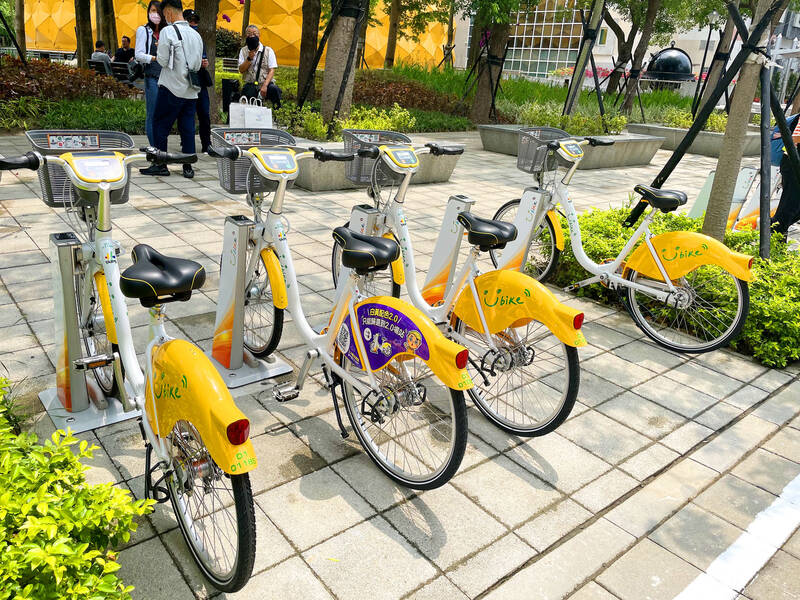Taipei is to end the YouBike 1.0 service on Dec. 3, with bicycles only from the YouBike 2.0 service to be available after that date, the Taipei City Government said on Friday.
However, New Taipei City plans to keep the first-generation YouBike service until 2025.
From Dec. 6, people who rent a YouBike 1.0 bicycle in New Taipei City and return it to a station in most Taipei districts would be charged a NT$350 handling fee, the Taipei Department of Transportation said.

Photo: Tsai Ya-hua, Taipei Times
The handling fee is to be delayed until Dec. 9 in Taipei’s Nangang (南港) and Guandu (關渡) districts — both of which border New Taipei City — due to the popularity of the service in those areas.
The Taipei City Government said it had reached its target of 1,200 second-generation stations since the YouBike 2.0 system was introduced in May last year.
The target was set for the retirement of the older system.
YouBike 2.0 bicycles feature smart controls on the handle bars instead of on the stands, making it easier to install and maintain the stations.
Taipei officials are working with the counterparts in New Taipei City to distribute information about the termination of the YouBike 1.0 service, Taipei Department of Transportation official Liao Yun-ling (廖苑伶) said.
New Taipei City Transportation Department section director Wu Cheng-yen (吳政彥) said the city would maintain YouBike 1.0 alongside YouBike 2.0 before retiring the old system in 2025.
Both systems are available at every YouBike station in New Taipei City, making it easy for users to have a choice when renting and returning the bikes, and to ride a YouBike2.0 to Taipei.
In the 13 years since the service’s introduction, YouBike 1.0 usage has surpassed 200 million rides, the Taipei City Government said.
With the introduction of the second-generation service, usage of the initial system had fallen to 8.5 percent of rides in Taipei as of the end of October, down from 42 percent at the end of last year, it said.

Taiwan has received more than US$70 million in royalties as of the end of last year from developing the F-16V jet as countries worldwide purchase or upgrade to this popular model, government and military officials said on Saturday. Taiwan funded the development of the F-16V jet and ended up the sole investor as other countries withdrew from the program. Now the F-16V is increasingly popular and countries must pay Taiwan a percentage in royalties when they purchase new F-16V aircraft or upgrade older F-16 models. The next five years are expected to be the peak for these royalties, with Taiwan potentially earning

STAY IN YOUR LANE: As the US and Israel attack Iran, the ministry has warned China not to overstep by including Taiwanese citizens in its evacuation orders The Ministry of Foreign Affairs (MOFA) yesterday rebuked a statement by China’s embassy in Israel that it would evacuate Taiwanese holders of Chinese travel documents from Israel amid the latter’s escalating conflict with Iran. Tensions have risen across the Middle East in the wake of US and Israeli airstrikes on Iran beginning Saturday. China subsequently issued an evacuation notice for its citizens. In a news release, the Chinese embassy in Israel said holders of “Taiwan compatriot permits (台胞證)” issued to Taiwanese nationals by Chinese authorities for travel to China — could register for evacuation to Egypt. In Taipei, the ministry yesterday said Taiwan

Taiwan is awaiting official notification from the US regarding the status of the Agreement on Reciprocal Trade (ART) after the US Supreme Court ruled US President Donald Trump's global tariffs unconstitutional. Speaking to reporters before a legislative hearing today, Premier Cho Jung-tai (卓榮泰) said that Taiwan's negotiation team remains focused on ensuring that the bilateral trade deal remains intact despite the legal challenge to Trump's tariff policy. "The US has pledged to notify its trade partners once the subsequent administrative and legal processes are finalized, and that certainly includes Taiwan," Cho said when asked about opposition parties’ doubts that the ART was

If China chose to invade Taiwan tomorrow, it would only have to sever three undersea fiber-optic cable clusters to cause a data blackout, Jason Hsu (許毓仁), a senior fellow at the Hudson Institute and former Chinese Nationalist Party (KMT) legislator, told a US security panel yesterday. In a Taiwan contingency, cable disruption would be one of the earliest preinvasion actions and the signal that escalation had begun, he said, adding that Taiwan’s current cable repair capabilities are insufficient. The US-China Economic and Security Review Commission (USCC) yesterday held a hearing on US-China Competition Under the Sea, with Hsu speaking on